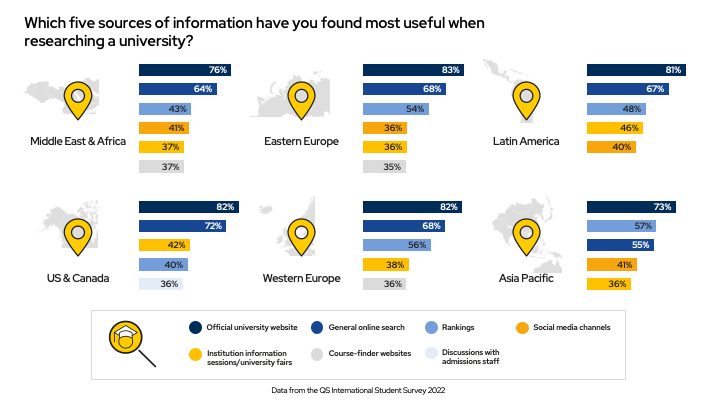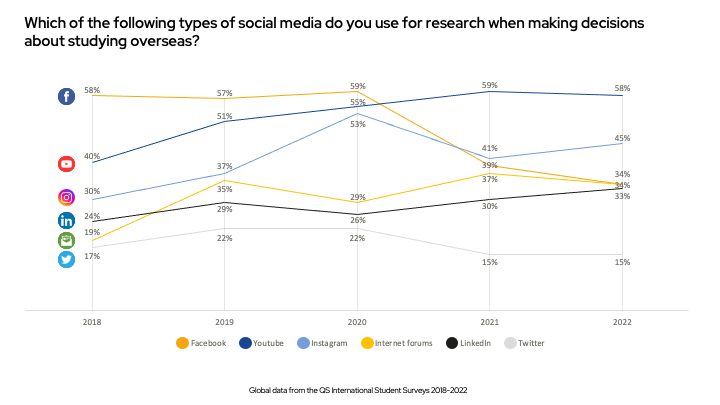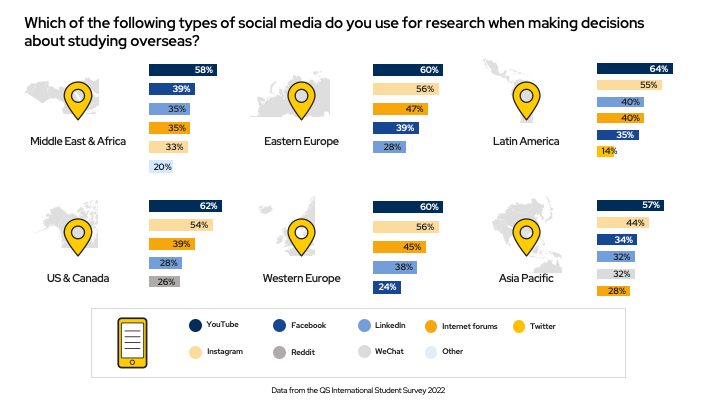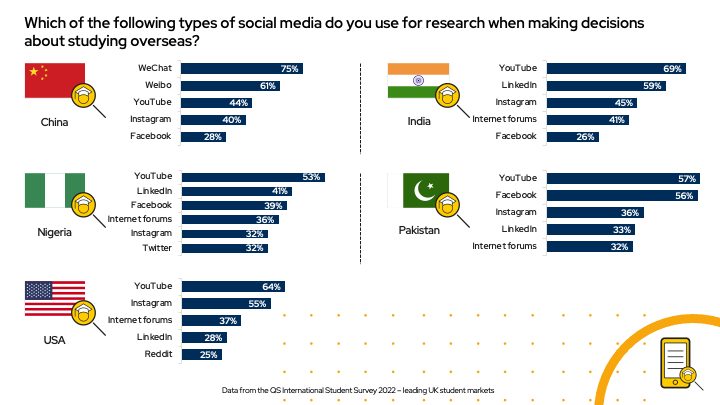With so much potential for engagement and interaction with prospective students through social media channels, how can institutions decide where and when to invest their team’s time and resources?
We’ve analysed data from the latest QS International Student Survey – the world’s largest survey of prospective international students – to understand the importance of social media channels in influencing choices in study destination and course.
In addition, we’ve spoken to QS Social Media Manager Dannielle Noonan and QS Commerical Lead Kesh Patel for their expert views on where universities can have the most impact on social channels and which content is most likely to resonate.
So, how important is social media in student decision-making relative to other tools and channels?
The results show that social media continues to play a vital role in study destination research for the majority of prospective international students: it’s in the top five information sources for many major recruitment markets including India and China.

Prospective students from Western Europe, the US and Canada do not rate social media in their top five research tools. Instead, they place greater value on direct interaction and engagement with university staff, with 36% of North American respondents citing discussions with admissions teams and 36% of Western European respondents saying they valued information sessions from institutions and university fairs.
How has social media platform choice evolved over the past five years?
As you might expect the popularity of Facebook as a research tool has declined significantly over the years, with 58% of prospective international students identifying it as a research tool in 2018, compared with 34% in 2022.

Conversely, reliance on YouTube as a research tool has increased throughout the years, with 58% of international prospective students using this channel in 2022. Engagement with Twitter has remained relatively stable over that time while Instagram has fluctuated more over this period with a high of 53%.
QS Commercial Lead, Kesh Patel, gives his perspective on why YouTube is such a popular choice for prospective students: “For the higher education sector and student recruitment, young people today are looking for that authentic opinion from someone they trust. They want to see and imagine what it would be like on campus as a student. As it’s not always possible to be there in person, YouTube provides the perfect alternative.”
Instagram is another major influence on student decision-making – whether future students watch reels to get insight on the best spots for students to study on campus, or tips on how to balance their studies more effectively, a growing number of institutions are turning to student influencers to raise brand awareness, increase engagement and connect with target audiences.
“Universities that allow their students to take over their platforms on a regular basis will interact and engage with prospective students effectively,” adds Kesh. “This approach works particularly well when the student is in the conversion phase of the applicant journey.”
In the US and Canada, prospective students are expanding their research methods – with 26% of respondents turning to the user-led discussion and news platform Reddit to help with their study choices, and 20% to TikTok.

TikTok is also becoming an established channel for student engagement for many universities – with the University of Cambridge at nearly 100k followers, University of Sydney at 47.6k, University of Glasgow at 21.5k and Penn State University at 15.9k.
Speaking on the rise of TikTok as a research tool, Dannielle Noonan, Social Media Manager at QS, said: “Short-form videos are key on all social media platforms. While static images do have their place in an institution's social media strategy, they are less likely to be shown to your audience.”
Taking a closer look at leading markets for UK institutions, it will come as no surprise that 75% of prospective Chinese students prefer to conduct their research using WeChat – Weibo was their second top choice with 61% of responses.

What are some of the most effective ways institutions can use social media for student recruitment?
Here are our top three tips for how universities can build meaningful relationships and engagement with prospective students on social channels:
- Create authentic content
“Authentic content that captures the student voice and celebrates students’ achievements is bound to resonate with both prospective and current students,









.jpeg)









